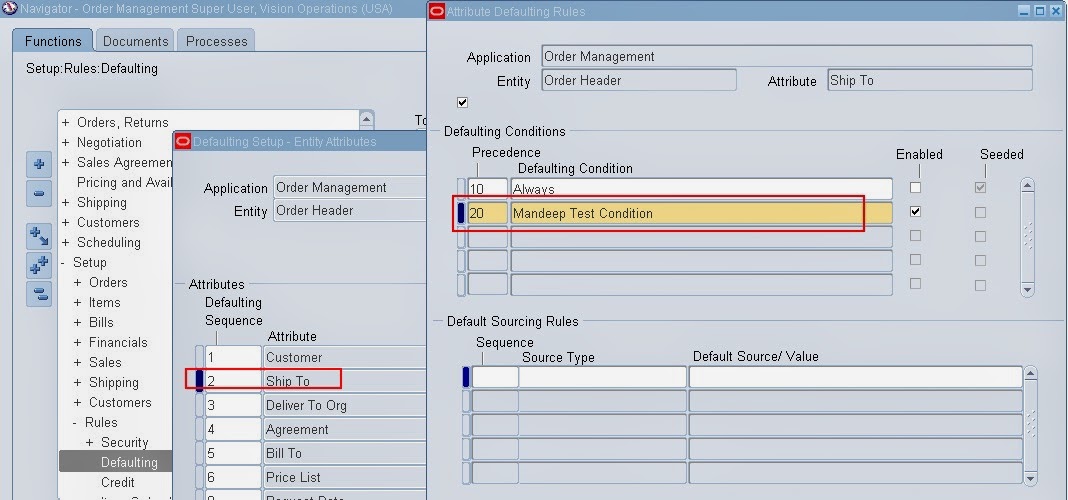Sales Order Defaulting Rules
Defaulting rules in Order Management determine how certain fields on sales order headers or sales order lines level will default.
Oracle apps provide both seeded and user defined defaulting rules. You can use defaulting condition templates to built your own rules and conditions to default these fields.
Navigation: OM>SetUps>Rules>Defaulting
A Defaulting rule Consists of following
As the name suggest, this is the condition which validated at the time of defaulting. It is the first filter validated before a defaulting rule is applied.
Always: is the generic condition which is seeded and generic one.
You can use defaulting condition templates to define new conditions. We have defined a condition that when Warehouse is V1. So when where house is V1 condition is met we can default various filed.
Precedence
Precedence as name suggest, is the priority in importance. Lower the precedence, higher is the priority.

Here in above case Always has Higher priority than our condition "Mandeep Test Condition" as the precedence is lower.
Default Source/ Value
Default Source/Value is the value which system is going to get or default for the sales order header Customer field.
Here in above case we want when warehouse is V1, then ship to should default from sales agreement header values.
Source type
Source type is the type of the source from where the value will be defaulted
Reference : Oracle Metalink
Sequence
In Defaulting rules, sequence work as Precedence. Its the order in which defaulting take place. If same sequence then alphabetical order come into place
Thanks
Mandeep
------------------------------------------------------------------------------------------------------------------------------------------------------------------
Please share this knowledge with your friends and subscribe at our blog for more updates. If you have any queries, please participate in our Forum or by leaving your comments below.
------------------------------------------------------------------------------------------------------------------------------------------------------------------
Defaulting rules in Order Management determine how certain fields on sales order headers or sales order lines level will default.
Oracle apps provide both seeded and user defined defaulting rules. You can use defaulting condition templates to built your own rules and conditions to default these fields.
Navigation: OM>SetUps>Rules>Defaulting
A Defaulting rule Consists of following
- Defaulting Condition
- Precedence
- Default Source/value
- Source Type
- Sequence
Defaulting Condition
As the name suggest, this is the condition which validated at the time of defaulting. It is the first filter validated before a defaulting rule is applied.
Always: is the generic condition which is seeded and generic one.
You can use defaulting condition templates to define new conditions. We have defined a condition that when Warehouse is V1. So when where house is V1 condition is met we can default various filed.
Precedence
Precedence as name suggest, is the priority in importance. Lower the precedence, higher is the priority.

Here in above case Always has Higher priority than our condition "Mandeep Test Condition" as the precedence is lower.
Default Source/ Value
Default Source/Value is the value which system is going to get or default for the sales order header Customer field.
Here in above case we want when warehouse is V1, then ship to should default from sales agreement header values.
Source type
Source type is the type of the source from where the value will be defaulted
Reference : Oracle Metalink
Sequence
In Defaulting rules, sequence work as Precedence. Its the order in which defaulting take place. If same sequence then alphabetical order come into place
Thanks
Mandeep
------------------------------------------------------------------------------------------------------------------------------------------------------------------
Please share this knowledge with your friends and subscribe at our blog for more updates. If you have any queries, please participate in our Forum or by leaving your comments below.
------------------------------------------------------------------------------------------------------------------------------------------------------------------



This comment has been removed by the author.
ReplyDelete